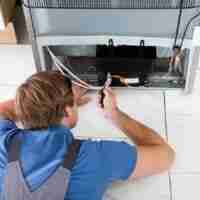How to test a refrigerator compressor. A refrigerator compressor is a part that proves vital for keeping food and drinks cool, like what you find in a fridge, for example.
This part can last for about 10 to 15 years on average, but inevitably it will die down, albeit probably sooner than what most people would prefer.
There will come the point when the Compressor gives out, and no matter how you try to repair or replace it, it will never work again.
The signs of this are known – from abnormal sounds from the Compressor, such as weird buzzing noises, or if you notice the fridge getting hot even though it’s supposed to do just the opposite.
There’s also overcompression or frequent cooling troubles where your fridge turns off and on frequently which shouldn’t happen considering how your old one worked without any issues!
How To Test A Refrigerator Compressor
We will discuss here methods that how we can test a refrigerator compressor.
1. Check The Compressor Windings
It’s important to be ready for this. Have the fridge and other electrical equipment like a fan or a light fixture moved away from the wall and unplugged from the power source.
Next up, grab a digital multimeter to measure how hot it is inside; if it’s not too high (more than 80 degrees Fahrenheit), open the window as fresh air will help cool down your living space.
But remember that you have no choice but to stay with your AC on at this point or sleep elsewhere if the temperature is going very high while adjusting temperatures isn’t much of an option!
2. Check for Shorted Motor Windings
You can have two types of shorts in your fridge, either a turn-to-turn short within a winding or a winding-to-frame short.
Use your trusty multimeter to measure the resistance between the Run and Common pins and the Start and Common pins.
If these measurements are significantly different, the winding with a considerably lower reading has a turn-to-turn short and needs to be replaced.
Test for winding to frame being open – test each pin against one another and against the post on the Compressor body to see if readings are any lower than what is displayed on the multimeter’s LCD.
If they do, then we know there’s an issue with the Compressor that needs to be replaced!
3. Check the Thermostatic Control
Sometimes when a motor isn’t working properly, the flow of power may have stopped in its tracks because the contacts that allow it to pass through have created resistance.
If this is the case, you can easily check by inspecting the electrical connections and checking for any damage or buildup.
If there are problems with the contacts, cleaning and repairing these can quickly solve your initial problem. Check inside for burnt wire ends or any other abnormalities causing an issue.
Often you will find that some wires are bent at a 90-degree angle or odd angles, making them unable to operate freely and smoothly without causing problems.
Ensure all cables are securely placed within their metal couplers and rewired if necessary so as not to cause damage during use.
4. Other Potential Issues
If the Compressor is not starting up normally even though it’s passing tests and performing as expected, its bearings may have been damaged.
On the other hand, if your Compressor still starts up at times but is under-performing when you know it should normally be running, it may have moved out of Sync.
FAQs
How many ohms should a refrigerator compressor have?
When using your trusty multimeter, you should read that the resistance between the Run pin and Common and Start and Common is approximately 5 ohms.
What causes a refrigerator compressor to stop working?
There are two ways that refrigerant in your system could be off-balance. Either it has too much or too little pressure or strain.
The solution to this problem is the same whether you’re dealing with a system with too little or too much refrigerant.
If the issues you’re currently facing take place during normal operation, then there’s a good chance that one of the components in your air conditioning unit is faulty and needs to be replaced.
Related Guides



